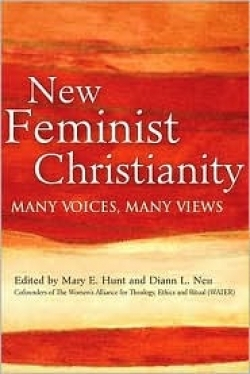New Feminist Christianity
Many Voices, Many Views
For many, Christianity is not the first thing that comes to mind when the word “feminism” is mentioned. However, in Mary Hunt and Diann Neu’s New Feminist Christianity, the editors and other contributors make the case that feminism is alive and well within the church today, and in fact has been at work within church and non-church organizations throughout history.
This book is a compilation of essays written by upwards of twenty-five authors, all feminists and all women. Many are teaching and publishing in academia, and as a result the book takes on a fairly theoretical tone and focus (perhaps to the dismay of laypersons reading this book). However, some jewels of attention to day-to-day practical matters can be found here, particularly in those essays written by women actively involved in church ministry.
The editors are codirectors of WATER, the Women’s Alliance for Theology, Ethics, and Ritual, and both have roots in the Roman Catholic Church: Hunt as a feminist theologian and Neu as a liturgist and minister. They have collected the work of highly-credentialed writers, who provide perspectives on both the state of Christian feminist movement in the US and a vision towards the future of Christian feminist transformation of the church.
The essays discuss major theme areas such as: feminist theological visions (what is Christian Feminism all about?), scriptural insights, ethical agendas, liturgical and artistic frontiers, and ministerial challenges. Feminist voices come from across denominations and ethnic traditions, presenting perspectives from the Roman Catholic Church to the Evangelical and Mennonite traditions and beyond. Practitioners and students of Christian ministry as well as students of Christian theology would greatly benefit from this volume.
While it can be difficult to pinpoint an emergent conclusion from so many contributors, a few themes tie many of these thinkers together. For one, many contributors seem to agree that Christian feminism should be inclusive and work to open the church to new understandings of religious expression. Many also point to the future work of feminist ministers as that of moving theological gains in the academy into action in the church pews, and even becoming more open to interfaith involvement.
The editors remind, however, that this will not be easy. They acknowledge, that despite the gains feminists have made in the church, it is still, “not easy to be a feminist today, to use the ‘F word’ without apology.”
Reviewed by
Gabriela Worrel
Disclosure: This article is not an endorsement, but a review. The publisher of this book provided free copies of the book to have their book reviewed by a professional reviewer. No fee was paid by the publisher for this review. Foreword Reviews only recommends books that we love. Foreword Magazine, Inc. is disclosing this in accordance with the Federal Trade Commission’s 16 CFR, Part 255.

